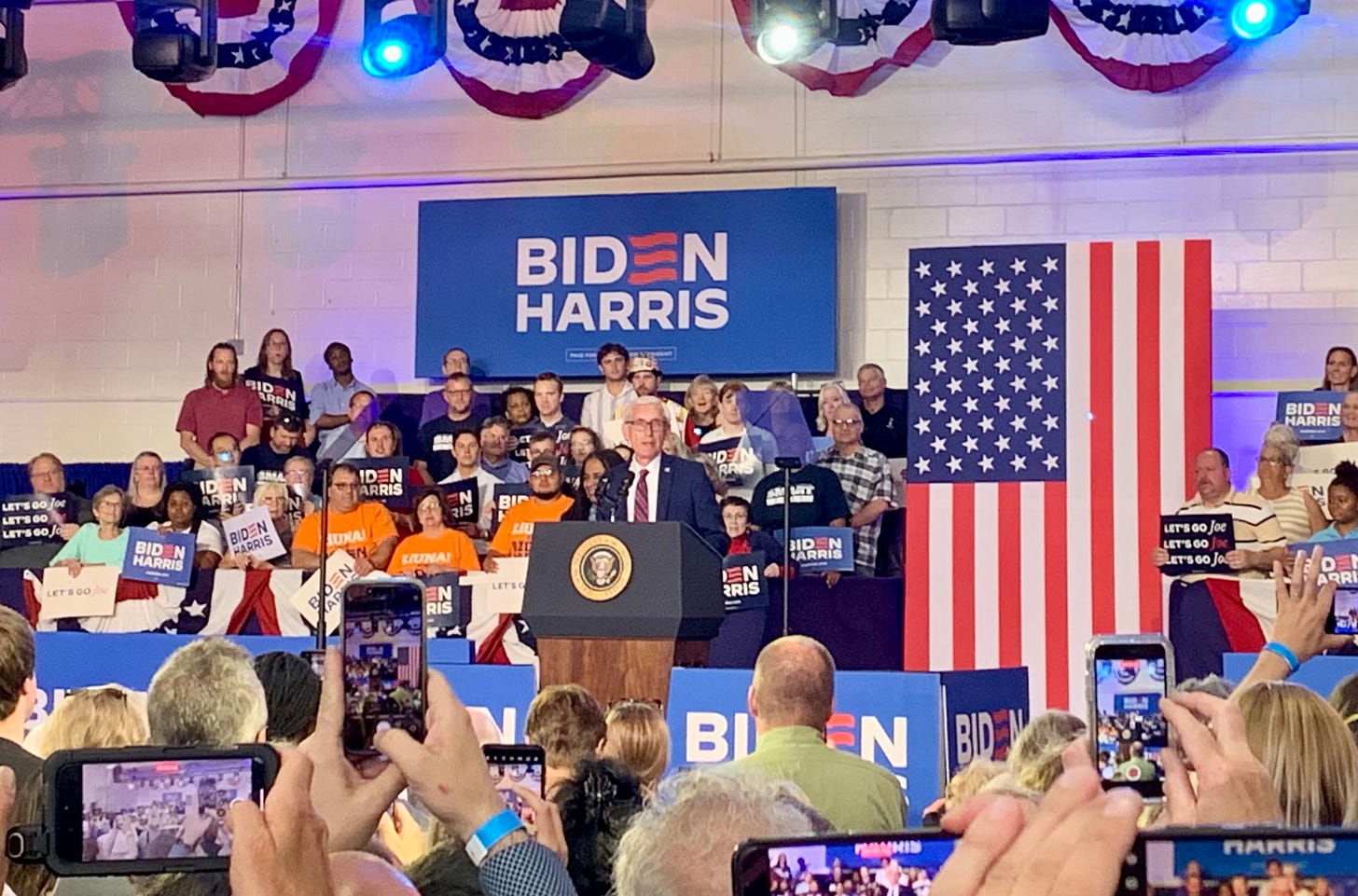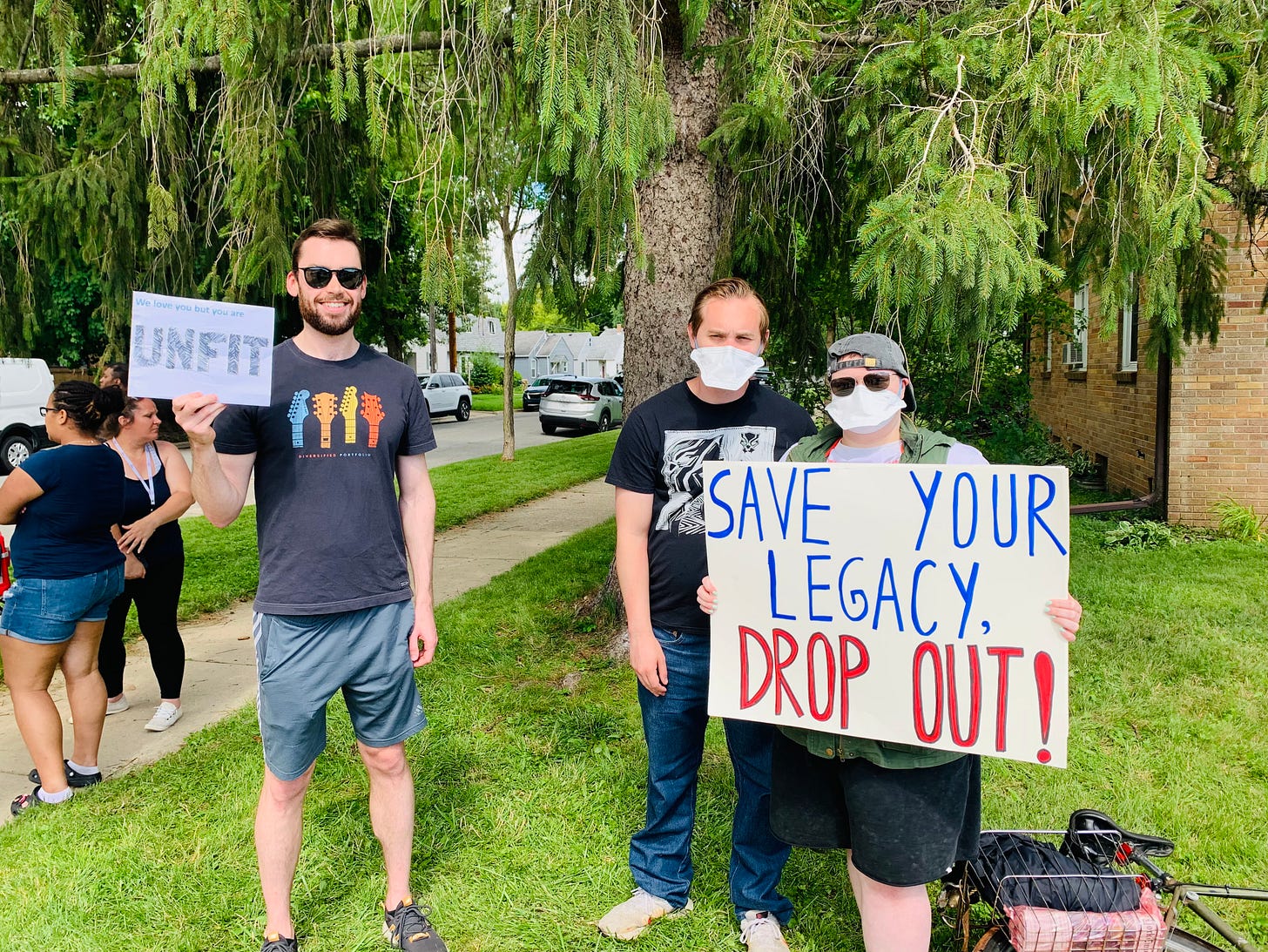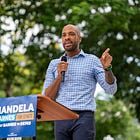FULL COLUMN UNLOCKED🔓: Pass the Torch: Tony Evers should not run for a third term as governor
Wisconsin's governor needs to do what so many other Democrats have failed to do and step aside when the time is right. Full column now available for all readers and subscribers.
The Recombobulation Area is a thirteen-time NINETEEN-TIME Milwaukee Press Club award-winning opinion column and online publication founded by longtime Milwaukee journalist Dan Shafer. The Recombobulation Area is now part of Civic Media.

This column was first published on June 10. We are republishing it here as it originally ran, this time with no paywall midway through. You can listen to discussion about this column on the Civic Media network and beyond, here and here.
Tony Evers has been a very good governor for the state of Wisconsin.
You could even argue he’s been great, given the perilous moment in American democracy that’s surrounded his time in office. He’s been the central political figure in Wisconsin’s crawl back from the disastrous Scott Walker years, and as the bulwark against the heavily gerrymandered hard-right Republican-controlled legislature, with their obstructionist measures beginning even before Evers took office, and continuing — and sometimes accelerating — throughout his two terms. He brought sanity and stability to the state during the Covid-19 pandemic in 2020, and has helped steer Wisconsin toward a brighter future. As Ben Wikler noted in a recent interview with The Recombobulation Area, Evers’ veto pen “has been one of the most important collections of atoms in the world in defense of democracy in this state,” and I wholeheartedly agree. Wisconsin is better off for having Tony Evers’ time as our governor.
Dan Kaufman’s “The Fall of Wisconsin” documented the calamitous decline of the state throughout much of the 2010s, when Republicans controlled all three branches of government. In the six-and-a-half years since, Evers has never allowed Wisconsin to truly fall. He has been a remarkably important governor at a remarkably important moment.
To be sure, there have been times in which I’ve disagreed with the governor. There have been missteps or poor decisions. But much of that comes with the territory for nearly any public official with real power, and his successes have always overshadowed any shortcomings. Perhaps most importantly, he has always maintained a certain North Star of doing what’s right for Wisconsin. He’s been underestimated over and over again, and he’s proved many people wrong. It’s been a job well done by Two-Term Tony.
But now, Evers is weighing a decision on whether to run for a third term, saying he’ll make the call after the state budget process is completed1. From the outside, it seems like he’s gearing up for another run, even if multiple sources say he genuinely has not yet made a decision. But I think running again would be the wrong choice.
All things must pass. Tony Evers should not seek a third term as governor of the state of Wisconsin. It is time for him to do what so many Democrats have struggled so mightily to do and step aside when the time is right. For the 73-year-old governor approaching a critical moment in his second term with 2026 and the midterms on the horizon, the right time is now.
This is not ultimately an argument about ideological differences or policy disagreements. It’s not about any particularly regrettable actions Evers has taken while in office. He has served the state well. But he is not a young man, he is not going to be governor forever, and at a certain point, he’d be putting a whole lot more than his own legacy at risk by failing to recognize the long-term implications of not passing the torch to the next generation of leaders, and the short-term implications of running when you might be too old for the office.
In November 2026, when the next gubernatorial election is held, Tony Evers will turn 75 years old2. If elected to a third term, he would turn 79 while in office, making him one of the nation’s oldest governors. He’s already the nation’s seventh-oldest governor, and five of those older than him are term-limited from running again. For anyone even in perfect health at that age, there are going to be risks involved — risks that are perhaps not worth taking, given recent history.
This is a conversation we need to be having and we need to be having it now. Refusing to do so is putting Wisconsin Democrats on the same path that national Democrats found themselves in in 2023 and early 2024, and by the time a change was made, so much of the damage had already been done. Joe Biden should never have run for re-election, and instead should have been the “bridge” candidate that he alluded to being when he ran in 2020, and this is a big reason why we are where we are.
So, yes, the comparisons to the situation surrounding former president Joe Biden are inevitable. It is a central part about why I’m making this argument. But it’s not quite that simple. Evers-Biden does not amount to a direct, one-to-one comparison. Joe Biden is nearly a decade older than Evers, and while Biden was an unpopular president thought to be too old for the office even before the fateful June 27 debate last year, Evers might be the most well-liked politician in Wisconsin right now3. And while Evers may have verbal stumbles from time to time — the DNC roll call vote moment was probably the highest-profile example — his skills as an orator have never exactly been his calling card, and he has not shown the signs of cognitive decline that plagued the former president. The governor might seem a tad older now than when he was first elected, but not drastically so. He seems … well, about six or seven years older than he did when he was first elected to the office at the age of 67, which is what he is.
To be sure, there can be effective older politicians, and there can be problematic younger ones. Age alone is far from a lone determining factor in assessing the quality of an elected official. Donald Trump is the oldest president ever elected, and JD Vance is one of the youngest vice presidents in American history, and both are extraordinarily poor leaders.
“The gerontocracy is a problem that permeates every level of government.”
Truthfully, though, we should not be expecting so many of our elected officials to serve into their late 70s, or beyond. Trump is too old to be president, too. It should not be so difficult for politicians to retire at a more reasonable age. There is a reason this is generally considered retirement age. Along with the presidency, where Biden and then Trump will each likely set the record for oldest presidents ever to serve in the office, this problem has been most pronounced in the U.S. Senate, where there are more senators over the age of 75 (12) than there are senators younger than 50 (11)4. And the gerontocracy is a problem that permeates every level of government.
When politicians remain in power later and later into life, it stymies the ability for new leaders to rise. It’s hard for a next generation of leadership to emerge without actual opportunities to do so. We’ve obviously seen that happen at the national level, and here in Wisconsin, there’s a big, weird Democratic primary looming for the next open race for statewide office, but we’re not going to know how these candidates might campaign or how voters might respond to them until it goes from the hypothetical to reality.
Clinging to power for too long can be more about one’s own personal glory. Serving in public office is about the people, not the person. The office is bigger than the person elected to it, and failure to grasp that is its own form of small-d democratic undoing.
The Democratic Party, in particular, has been haunted by its unwillingness to pass the torch to a new generation. Clearly. Whether it’s been in Joe Biden’s catastrophic debate performance after his regrettable decision to seek a second term, the late Justice Ruth Bader Ginsburg refusing to retire at age 80 following President Barack Obama’s re-election, or even in more recent years, as eight members of Congress have died in office since November 2022, including three who have died in office since November's election (all Democrats, by the way), it’s been a massive, inescapable problem for the party.
How many more signs do Democrats need?
How could we not be talking about this, at this critical moment? At very least, this demands a conversation, which no one appears to be having — at least not publicly. Maybe Democrats still haven’t learned anything from their failures in 2024.
Because what happened with Joe Biden last year — from the debate to the dropout and everything connected to it — directly contributed to Donald Trump’s return to the White House. The ongoing fallout surrounding Biden’s decline continues to threaten the credibility of the party at large. So, when are Democrats going to wake up and take this problem seriously?
Tony Evers has the opportunity now to do what other Democrats haven’t and actually step aside when the time is right. It would be courageous for him to do so, and such a decision would have tremendous significance.
It’s one thing for a safe, blue-state senator like 80-year-old Dick Durbin of Illinois to say he’s retiring. It would be quite another for Evers, a popular 73-year-old governor in a purple state, to do so. But until the Democratic Party faces this problem head on, it’s going to continue to linger. By choosing not to seek re-election now, Evers could serve as an example for Democrats around the country. And here in Wisconsin, we know that what starts here can reverberate nationally.
A third term is also a different kind of ask for voters. In a recent interview with Wisconsin Eye, State Sen. Kelda Roys, who ran against Evers in the 2018 primary, made the point recently that “traditionally, two terms has been plenty for a lot of Wisconsin governors.” Since the state constitution was amended in 1967 to change the length of a gubernatorial term from two years to four, Tommy Thompson has been the only governor serving a four-year term elected to a third (and then fourth). Third terms are more difficult electorally, too. Ron Johnson and Tammy Baldwin each faced the toughest races of their careers, respectively, and Scott Walker lost in his bid for a third term for governor.
That joins a number of other reasons (which we’ll get into) why now is the right time for Evers to pass the torch. But perhaps the biggest reason among them amounts to this:
In May of 2011, the late Herb Kohl was 76 years old when he announced he’d be retiring at the end of his term. In the 2012 election, holding the seat for Democrats was far from guaranteed, coming off a brutal midterm where Scott Walker and Ron Johnson won statewide and Republicans flipped the state legislature. But Tammy Baldwin won — defeating Tommy Thompson, no less — and the torch was successfully passed, and now Baldwin is serving in her third term in the U.S. Senate. Kohl’s legacy is now undeniable — and he got to spend his golden years riding shotgun in the vehicle leading the Milwaukee Bucks’ championship parade instead of dodging questions about whether or not he was mentally competent while in office, whether or not he was covering that up, and whether that contributed to the rise of fascism in America.
At a news conference announcing his retirement, Kohl said this:
“The office doesn't belong to me. It belongs to the people of Wisconsin, and there is something to be said for not staying in office too long.”
He couldn’t have been more right — or more prescient.
So, does Tony Evers want his legacy to be more like that of Herb Kohl or of Joe Biden?
Reckoning with Biden
We all saw the debate. It was a complete, unmitigated disaster. At the end, I sat there in silence before audibly exclaiming, “Well, I guess Donald Trump is going to be the president again.”
In the following days and weeks, it was incomprehensible to me how anyone could possibly defend Joe Biden’s performance in that debate. This was not a man capable of running for any office at any level, much less for President of the United States. The fact that it reached that point is a complete organizational failure on the part of the Democratic Party, too afraid of its own shadow to state the obvious, that the then- 81-year-old president who struggled stringing coherent sentences together should not run for another four-year term.

Being at Biden’s rally in Madison just eight days later (where he was also quite bad!), the day of his interview with ABC’s George Stephanopolous (which, again, was also quite bad!!), I could not believe the Democrats willing to play this out, refusing to recognize the obvious. At the RNC in Milwaukee weeks later, Republicans were spiking the football, supremely confident that Donald Trump would be returning to the White House, while Democrats twisted themselves in knots to defend Biden.
That Biden still believes he would have won and continues to profess as such is complete and utter lunacy. Not only would he have lost, it would have cost Democrats several more Senate seats — including the one narrowly won by Tammy Baldwin here in Wisconsin — and would have given Republicans a gargantuan House majority. Down-ballot, rumblings I’d heard could have put the Wisconsin State Legislature on the verge of a Republican supermajority, even under new maps. Biden could very well have lost states like Minnesota, New Hampshire and Virginia if he stayed in the race, and Trump’s victory could have been the biggest since Obama in 2008. Switching to the Kamala Harris-Tim Walz ticket prevented a generational disaster for the party, even if it ultimately came up short.
You can’t run a campaign based on honesty and integrity while asking people to deny the evidence of their eyes and ears, and yet, that’s exactly what Biden was doing. The political hypocrisy of this, particularly among his ongoing defenders, continues to threaten the credibility of the Democratic Party — the if they lied about this, what else weren’t they telling the truth about? questions do follow a certain logic path, don’t they?
There needs to be a larger reckoning within the party about what happened, a reckoning that, frankly, has not yet materialized in a meaningful way. That meaningful way would mean precisely what we’re talking about here — someone around Evers’ age deciding to step aside at a time when it’s a genuine debate on whether or not to do so.
I am a firm believer that what happens in Wisconsin politics can often be a preview of what’s to come on a national scale. That much-needed reckoning can begin in earnest here, and it can begin with Tony Evers choosing to pass the torch.

The big, weird primary looms — and it would be a good thing for Wisconsin Democrats
Democrats, to their detriment, have also gone out of their way to avoid primaries. Perhaps the most problematic element of the transition from a Biden-Harris to Harris-Walz campaign was the lack of a real primary. With apologies to the (entirely vindicated!) former Minnesota congressman Dean Phillips, Biden didn’t face a real challenge in the primary, either.
Now, yes, Harris was the vice president, and she was elected on the same ticket Biden was, and I ultimately had no major problems with how this was handled, considering the shortened timetable involved. It was an acceptable enough process, but still not a good one. Democrats would have been better off with a real primary — a primary that Harris very well may have won, but one where the voters are the ones making that choice.
In this perilous moment for the Democratic Party, it should be the voices of the voters who are paramount — not what’s coming from strategists and consultants, or those on a fool’s errand to find the “Joe Rogan of the left,” or who wants to offer a nonsense debate between “Abundance” and “populism.” It’s not about an individual, it’s about the people getting the chance to make their voices heard and decide who they want to lead. That’s what Wisconsin needs when choosing its next governor, too.
The last time there was a Democratic primary for a statewide race in Wisconsin, the lack of a true primary proved to be problematic here, too. In 2022, just weeks before the August vote, every competitive candidate for U.S. Senate dropped out and endorsed the frontrunner, former Lt. Gov. Mandela Barnes. And while Barnes still probably outperformed expectations in the race for U.S. Senate, he also was never meaningfully challenged before the primary, and when the post-primary onslaught of attack ads came, he and his campaign seemed flat-footed in their response. Could a more competitive primary have sharpened the campaign for when it was time to go up against the incumbent, Sen. Ron Johnson, and the Uihlein-funded machine behind him? I tend to think so.
Certain campaigns like to avoid primaries so their fundraisers can have a longer runway and can focus their spending in the general election. The timing of Wisconsin’s August partisan primary does put a whole lot of pressure on the eventual winner to run a general election campaign in less than three months. But there is also an iron-sharpens-iron aspect of this that is avoided when anointing a candidate in such a manner. Being tested in a primary makes a candidate stronger, and I think both Harris and Barnes would have been more ready for the home stretch had they done more to earn their respective nominations from the voters.
Democrats also get obnoxiously hung up about turns. About who’s turn it is to run, and when. This position is toxic, harms the larger growth of the party, and is fundamentally undemocratic. There’s few things more irritating in politics than hearing Democrats whine about whose turn it is to run for something. That is something that absolutely needs to come to an end.
There are quite a few political careers in Democratic politics in Wisconsin hinging on what Tony Evers decides about 2026. They have a pretty strong bench right now, all things considered. But the people on that bench are only going to exist in the political abstract before they actually hit the campaign trail and make their case to voters, provided they get that chance.
Because again, this is not about the individual. It is not about whose turn it is. Who might succeed Evers is not up to the next chair of the Democratic Party of Wisconsin, or who might be an endorsed or anointed candidate, or even to Evers himself. It is about the voters of Wisconsin choosing their future.
If Evers decides not to run, candidates could include Attorney General Josh Kaul, Secretary of State Sarah Godlewski, Lieutenant Governor Sara Rodriguez, State Senator Kelda Roys, Milwaukee County Executive David Crowley, soon-to-be former party chair Ben Wikler, and undoubtedly a few more.
These are all more-than-qualified candidates. I may favor some over others, but that’s not important. What’s important is that the selection is made by the voters. That’s the only way we are going to get on the right path for our political future — through the small-d democratic process. There’s a reason so many of us believe so strongly in democracy. It’s time Democrats recognize that they are doing a disservice to us all by avoiding primaries, taking “turns” and being so afraid of their own shadow that they become afraid of their own voters.

Midterm history and the GOP’s lackluster 2026 field
The history of midterm elections suggests that Democrats will be in an advantageous position come 20265. The party that does not control the White House tends to do better in the midterms. The 2022 election cycle was a more muted version of wave elections in 2010 or 2018, but the larger history of this dynamic makes this impossible to ignore, and is certainly a factor looking forward to Nov. 3, 2026.
That history, coupled with potential backlash to what’s happening with the Trump administration and Republican majorities in Congress, along with an ongoing realignment that might make Democrats more successful in non-presidential elections, could be a recipe for Democratic success next year. That is, if the party can get itself together and start heading in a better direction.
Worth noting, too, is how lackluster the GOP field for governor appears to be at the moment. The WisPolitics straw poll, taken at the Republican Party of Wisconsin’s convention in mid-May, showed the top two vote getters as Congressman Tom Tiffany and Washington County Executive Josh Schoemann. Neither are strong candidates for statewide office. Schoemann seems wildly overmatched for a run like this6 and while Tiffany might have better chances of the two, he is a poor fundraiser, even as he’s been boosting his name ID with appearances on right-wing media, and it remains to be seen if he has any sort of cross-over appeal outside of his deep-red district. Southeastern Wisconsin business executive Bill Berrien, a political unknown, is also considering a run, which…sure.
If Congressman Bryan Steil were to run, this might be a bit of a different story. He has consistently overperformed in a more competitive district, has been a very strong fundraiser, and many of the ingredients are there for him to be a formidable statewide candidate. But Steil recently celebrated a Trump endorsement for his re-election in the 1st Congressional District, which seems to suggest that’s where he’ll be running in 2026. Considering how he’s rising in the ranks in the House, he might be more suited for a future Senate run, anyway. Or, perhaps like Brian Kemp in Georgia, he’s smart enough to know this isn’t the right year for a Republican to run statewide in a 50-50 state.
More GOP candidates will likely emerge as this process plays out, but even as risk averse as Democrats can be sometimes, this Republican field should not have Democrats quaking in their boots.
Tantalizing trifecta potential
In press releases promoting the Democratic Party of Wisconsin’s upcoming convention — this weekend, in Wisconsin Dells! — the party and its leadership has promoted the possibility of a “blue trifecta” in 2026.
A Democratic trifecta in Wisconsin — controlling the governor’s office, State Senate and State Assembly — would be an enormously big deal. Next year’s midterm will be the first fully post-Gerrymander election, and Democrats have a realistic chance of flipping the Wisconsin State Legislature to their control for the first time in more than 15 years. Their chances are probably better in the Senate than the Assembly, but simply by winning in districts carried by Kamala Harris last year, they could flip both chambers. By holding the governorship, they’d have the opportunity to govern with a real majority and advance a real Democratic agenda.
The prospect of being the one to oversee that has to be a tantalizing one for Tony Evers and his team. To be the governor to defeat The Gerrymander, usher in a trifecta, and then govern with a true Democratic majority would be a mammoth achievement.
But at the end of the day, such an achievement is not one for Evers, it’s one for the people of Wisconsin. That’s who would stand to benefit, and that’s who this is about. And Evers’ legacy would be no less impressive if he were the one to put the wheels in motion for such an achievement. It might even add to it, since he will have left the state in far better shape than when he arrived. If he were to lose, particularly if he ran and encountered the type of health problems that can often greet people unexpectedly in their mid-70s, he could be the one chiefly responsible for squandering this once-in-a-generation opportunity.
Turning the page and making way for a new generation
Part of what was so thrilling about Barack Obama’s rise in 2007 and 2008 is that it seemed to signify a new generation in American politics. Coming out of the disastrous George W. Bush years, it seemed like Democrats were positioned as the party of a bold, ambitious future. But, post-2016, it’s virtually impossible to still see the party that way, especially after Joe Biden’s catastrophic 2024.
What happens in Wisconsin politics can have major national ramifications. We just saw that play out with the April race for Wisconsin Supreme Court having a major impact on the breakdown of the alliance between Donald Trump and Elon Musk. So, as Democrats look to rebuild on the national level, it is imperative that they learn from the mistakes that brought them to this moment, and change course.
Democrats need to stop running very old candidates for important offices. This much should be clear by now. Tony Evers can do what Joe Biden did not. He can choose to step aside and usher in a new era for Wisconsin Democrats. It would be an enormously consequential decision.
And this is an enormously consequential moment in America, and in our politics. Look around. The chaos, cruelty, corruption and wholesale destruction of our great nation’s core principles that’s been coming from the second Trump administration and the Republican Party must be met with a real opposition. For Democratic Party to mount this opposition, they have to address some of their own shortcomings, and that means recognizing when it’s time to make way for a new generation to lead.
Pass the torch, Gov. Evers. It would be the right thing to do. Heed the words of the late Herb Kohl and remember that this office belongs not to you, but to the people of Wisconsin. We’d be jazzed as hell if you left that kind of legacy for the state — and offered a courageous example to Democrats around the nation.
The Recombobulation Area is a reader-supported publication. To receive new posts and support my work, consider becoming a free or paid subscriber.
Dan Shafer is a journalist from Milwaukee who writes and publishes The Recombobulation Area. In 2024, he became the Political Editor of Civic Media. He’s also written for The New York Times, The Daily Beast, Heartland Signal, Belt Magazine, WisPolitics, and Milwaukee Record. He previously worked at Seattle Magazine, Seattle Business Magazine, the Milwaukee Business Journal, Milwaukee Magazine, and BizTimes Milwaukee. He’s won 23 Milwaukee Press Club Excellence in Journalism Awards. He’s on Twitter at @DanRShafer.
Subscribe to The Recombobulation newsletter here and follow us on Facebook and Instagram at @ therecombobulationarea.
Already subscribe? Get a gift subscription for a friend.
Part of a group who might want to subscribe together? Get a group subscription for 30% off!
Follow Dan Shafer on Twitter at @DanRShafer and at BlueSky at @danshafer.bsky.social.
On Wednesday, June 4, Evers and Republican legislative leaders released statements saying that budget negotiations had reached an impasse. Even before this, WisPolitics and others had already noted how the budget process was taking longer than usual. Shortly after this news was announced, the AP published a story on its implications for the governor’s race. There are governing implications for Evers’ decision, too.
Technically, Evers will be 74 on Election Day, as his birthday is Nov. 5. I happen to remember this because we have the same birthday (and so does Milwaukee Mayor Cavalier Johnson). Evers will be two days away from turning 75 on the midterm Election Day, Nov. 3, 2026.
In the most recent Marquette University Law School Poll of state voters, Evers’ net favorability rating was the highest among politicians polled. But he still was not a net positive, with a 47% favorable and 47% unfavorable rating among Wisconsin registered voters. His distinction as the most popular politician in the state largely comes from the fact that no one is especially well-liked.
This list skews more Democratic for those over 75, and more Republican for those under 50. Nine of the 12 over 75 are Democrats (or independents who caucus with Democrats, like Bernie Sanders), and seven of the 11 under 50 are Republicans.
You know, provided we have normal, democratic midterm elections in 2026 with Trump in office.
We recently published a piece on Schoemann from guest columnist Jordan Morales, on how the Washington County Executive failed to pass a police funding referendum in one of the reddest counties in the state.








Wisconsin will not vote for a woman, or a person of color, SADLY!!! I believe Tony is our best bet yet.